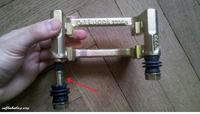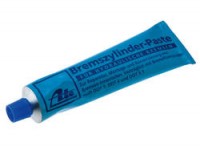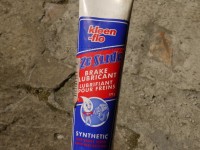grala1 wrote: The schools are different.
I stick to it so as not to lubricate the yoke - the place between the yoke and the pad.
Dust and sand settles in this place and then instead of the grease to help it, it bothers because it turned into an abrasive paste.
Exactly, you mustn't lubricate it with just anything.
Therefore, when repairing the brake system, use the technologies recommended by car manufacturers.
ATE Plastilube - does not catch sand dust - dries when lubricated, it is a kind of dry lubricant. A similar agent is produced by Bosch Textar, etc.
The ATE bremszylinder can be used to lubricate the brake piston and the caliper pin - generally where steel parts are covered with rubber gaskets. Brake fluid resistant. It does not dry out. A similar agent is produced by Bosch Textar, etc.

caliper yoke pin (photo taken from alfacholicy.org)





